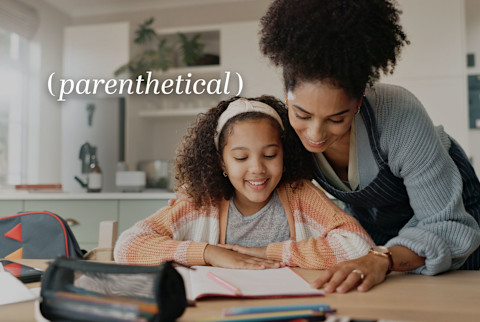Our Parenting Expert & Therapist Shares 5 Tips To Improve Your After-School Conversations

After school pick-up the other day, caregivers were discussing how they have no idea what their children are experiencing in school. When they inquire, their kids say “good” or “fine” and change the subject. I’ve been there: wanting to connect with my children, but noticing these open-ended questions are leaving me feeling dissatisfied.
Sometimes, the broader a question is, the more general the answer is.
Generic inquiries lead to automated responses because they are overwhelming. Why? There are so many things to say that it feels more manageable to default to a simple “good.” This is especially true for young children, whose experiences may be less cognitive and more based on sensation and emotion. For them, finding the right words can stump them. And so these prompts, while well meaning, do not meet them where they are at.
Here are 5 simple invitations that can allow you to feel more connected with your kids and have more fulfilling conversations.
Be the one who shares first
If the dinner table is the first time you’ve seen your kid in hours, making a request of them to share may feel abrupt. When I begin a session with a client, before I inquire about how they are doing, I often leave a minute or two for small talk, as this is regulating to our nervous systems.
In addition, you may want to share something surprising, fun, or difficult about your own day, before you inquire into theirs. The quality of what we are willing to share can impact the texture of what our children are willing to open up about.
Don’t be afraid to get specific—the people you spent time with, the feelings you had while eating your lunch on the park bench, the questions you pondered, the way you felt when you made a mistake—all of these personal shares model vulnerability for our children.
Even if they don’t replicate it right away, it is helping them map the bounds of their own line of questioning of themselves and others.
Do something connective before inquiring
It’s very difficult to move from stress to connection. This is because the part of our brains that are in “doing mode” impedes the part of our brains that need to be online in order for us to feel close to one another.
Opening up is easier when we are physically grounded and mentally at rest.
Taking a walk while holding hands, observing things in nature aloud, doing a 5 minute art project together, cooking a dish together, are all ways to bring us into our bodies and therefore preparing them to connect.
Be completely present
Children can sense when we are distracted. It is tempting to ask questions while we are unpacking a lunch box or cleaning up, but without our presence, they may be less willing to open up.
Consider how you feel when talking to someone looking down at his phone: You may be less apt to share specifically and openheartedly, because you are receiving the message that the other person isn’t truly available to that level of deep connection.
How are you showing your child with your body language and your eye contact that you truly want to hear the answers to the questions you ask?
Ask about what you really want to know
After experiencing something together, consider what you actually want to talk about. Think about questions or prompts that are open-ended, but also specific enough to set children up for success.
These are examples of questions that leave space but also are targeted and clear.
- What was the best thing you did today that you wish you could do every day?
- What activity did you do with a friend at school today?
- Tell me about a time you felt brave or proud today.
- Tell me about a time you felt sad or disappointed today.
- What is something you created today and what did you use to create it?
Don’t be afraid to go deeper by relating your experience
Sometimes caregivers do something called “stacking questions." When our children don’t open up, we just keep asking more questions and receiving the same shallow responses.
Instead of continuing to ask, weave in sharing.
If your child shares an experience, relate it to something you experienced at their age or in the present. If you see a situation differently then they do, don’t be afraid to both validate their experience and also share your divergent one.
This creates a culture of giving and taking, sharing and receiving, where each of you are interchanging the roles of speaker and listener, developing a beautiful dance of connection that they will carry through to other relationships.
The takeaway
Genuine connection takes regulated nervous systems, true presence, and both sharing and listening. Showing our interest with our bodies and our willingness to share personally, can create more dynamic conversations with our children.
